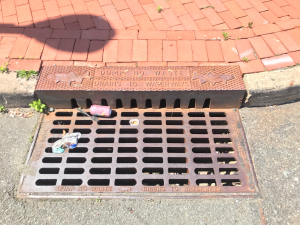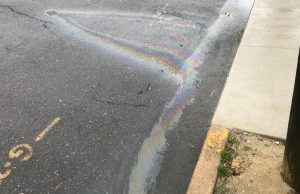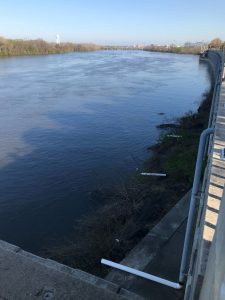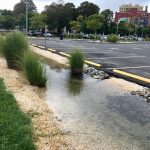New Jersey Future Blog
Making Savvy, Successful Stormwater Solutions: Why the Municipal Separate Storm Sewer (MS4) Permit Renewal Matters
June 24th, 2022 by New Jersey Future staff
By Andrew Tabas and Bree Callahan
As New Jersey faces increasing rainfall due to climate change and widespread water pollution, effective stormwater management becomes an increasingly important tactic for promoting healthy streams and improved water quality. When it rains, water hits impervious surfaces like streets and roofs, runs into storm drains, and then moves from pipes into rivers, streams, and other waterways. As the water moves along this path, it picks up contaminants like oil and pesticides. However, by treating stormwater at the source, before the contaminants are carried to local waterways, contamination can be effectively mitigated and water quality can be preserved. Green infrastructure, including rain gardens, green roofs, and porous pavement, treats stormwater at the source, which improves water quality.

Storm drains collect stormwater and convey it to nearby waterways. The “Dump No Waste: Drains to Waterways” text is an example of public education. The trash caught in the drain shows the importance of regular maintenance. Photo credit: Andrew Tabas. Location: Trenton, NJ.
For 456 municipalities across the state, the Tier A Municipal Separate Storm Sewer Permit (MS4 Permit) outlines rules to reduce water pollution conveyed from storm drains to waterways. For example, the permit prohibits illicit discharges of contaminated water into storm drains. Therefore, the MS4 Permit is a tool that can be used to improve the water quality of New Jersey’s rivers, streams, and lakes.
Every five years, the New Jersey Department of Environmental Protection updates the MS4 permit, which serves as an opportunity to improve its requirements. The current permit, which went into effect on Jan. 1, 2018, does not do enough to address water quality issues for several reasons. First, the 2018 MS4 Permit does not require municipalities to take actions to reduce runoff from existing development. Second, the 2018 MS4 Permit does not require towns to inventory and manage its stormwater infrastructure, including green infrastructure. Third, the 2018 MS4 Permit fails to address New Jersey’s many impaired streams identified through the Total Maximum Daily Load program adequately. Given the existing permit’s shortcomings, the permit renewal scheduled for Jan. 1, 2023 is a critical opportunity to improve water quality across New Jersey.

Stormwater picks up oil, trash, and other contaminants. If this stormwater is conveyed to streams without treatment, it brings the contaminants with it. Photo credit: Andrew Tabas. Location: Bordentown, NJ.
To meaningfully improve water quality in our state, New Jersey Future is advocating for the following to be incorporated in the 2023 permit renewal:
- Consistent emphasis on green infrastructure best management practices as viable and often preferable methods to reduce the amount of stormwater in the storm sewer system.
- Requirement for municipalities to develop results-driven Watershed Improvement Plans that include metrics for water quality and/or flooding improvements.
- Robust technical assistance, training, monitoring, and enforcement to support and incentivize communities to proactively and efficiently manage and minimize their stormwater.

Pipes convey stormwater from impervious surfaces into the Delaware River. Photo credit: Andrew Tabas. Location: Trenton, NJ.
To fund these improvements, New Jersey localities now have the option to establish stormwater utilities. Similar to any other utilities, such as water or gas, stormwater utilities are a dedicated funding mechanism used to pay solely for stormwater management. Property owners are charged a user fee based on the amount of stormwater that their property contributes to the stormwater system. Throughout the United States, stormwater utilities are widely considered the most equitable and stable approach for funding stormwater management programs.
In the past few years, loss of life, impaired water quality, interruptions in business, and millions of dollars worth of property damage have made it clear that the incentives for making smart stormwater decisions have never been higher. New Jersey Future and our partners support a stronger MS4 Permit to improve water quality, build resilience, and reduce risk. Stay tuned for NJDEP’s release of the final draft permit this summer to submit your comments to NJDEP!
Related Posts
Tags: green infrastructure, MS4, municipalities, sewer, Storm Sewer, Stormwater, stormwater utilities, Water, Water quality
















